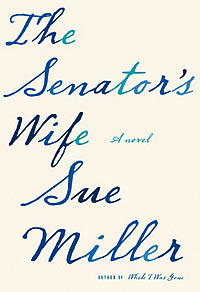Now Something from the Ladies
This publishing season has been good for novelists-so good, in fact, that a column on long-form fiction would take on quite a long form itself. We have thus narrowed down the purview of this month’s column by a full 50 percent: Here’s a glimpse at what’s new from female novelists only.

A Version of the Truth by Jennifer Kaufman and Karen Mack
Following up their successful Literacy and Longing in L.A., Jennifer Kaufman and Karen Mack have carried Bridget Jones-esque shenanigans into a comedic novel of academia.
Her lousy husband having drunkenly driven off the freeway into the ocean, 30-year-old protagonist Cassie Shaw finds herself single and without an income. Taking the most honorable path available, she lies on her resume in order to land administrative work at a prestigious university. Weaving between the territories of Helen Fielding (Bridget Jones’s Diary) and David Lodge (Changing Places), Cassie’s adventures inevitably bring her into the orbit of a professor about whom only one question should be asked: Will Colin Firth play him in the film adaptation, or will Hugh Grant?

The Senator’s Wife by Sue Miller
The single life is the furthest subject from Sue Miller’s eighth novel, The Senator’s Wife. A Midwestern couple, he an academic and she a radio producer, relocate to half of an attached New England town house, the other side of which is occupied by the titular wife, one of those long-suffering political spouses who privately suffers a lot less than anyone suspects. The senator, a retired political luminary of Great Society days, stops by only now and again, his marriage having been downgraded over the decades to just one affair among many. These couples, one on the rise and the other having settled onto a workable if unusual plateau, could hardly stand in starker contrast. Nevertheless, the once Oprah-spotlighted Miller manages to entwine their fates, along the way showcasing her penchant for bizarre couplings.

Fire in the Blood by Irne Nemirovsky
Unfortunately, one of these female authors can’t be here to enjoy the publication of her newest novel, but that it has seen publication at all is her readers’ great fortune. Fire in the Blood, the newly discovered work of Irne Nemirovsky, reaches shelves 65 years after her death in the Holocaust. The book follows Suite Fran§aise, also posthumously published, whose reflective depiction of French rural life during World War II made it a bestseller in 2004. The setting remains the village of Issy-l’vque, but this story looks past the country idyll, revealing a surfeit of deceit and claustrophobia behind pastoral appearances. Ostensibly, the story is about two marriages-one old, one new-but the narration, coming as it does from a semi-reclusive figure standing outside the social turmoil, offers more of a compellingly jaundiced look at humanity in general, enlivened by plot twist on top of plot twist.

Before by Irini Spanidou
Irini Spanidou’s Before plunges the reader straight into the New York of the early 1970s, revealing a bohemian rogue’s gallery huddled in SoHo in much the same way as a child overturns a log in search of slimy insects. Marriage, again, takes a central role here: Aspiring writer Beatrice resembles a more desultory member of Andy Warhol’s coterie, while hot-tempered painter Ned brings to mind more fictional painters than one cares to recount. In their austere loft building resides an impressively motley crew: the gay ex-con, the unpredictable rich kid. Amid the squalor, Beatrice drinks, spends the trust fund, and hopes for the best. She’s doomed, of course, just as was Warhol hanger-on Edie Sedgwick, but Spanidou focuses less on the destination than the journey. Or is the correct term “spiral”?

The Great Man by Kate Christensen
A much more nuanced artist is found in Kate Christensen’s The Great Man. As the New York Times page that opens the novel announces, Oscar Feldman, master painter of the female nude, has passed from this mortal coil. Two worshippers break out of the gate to reconstruct his parallel lives, interviewing the women who populated them: wife, sister, mistress, daughters. The biographers’ competition stirs up a rash of memories that sometimes agree, and sometimes don’t. As the writers struggle to assemble Oscar’s chronology, those he left behind must work out the complex array of dramas that exist between them. Some lives, it seems, are best described through their effects on the lives of others.



